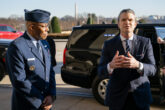April 13, 2020
How Donald Trump Ruined the Navy
No communications firm, pressed to design a case study on public-relations disasters, could likely top the Navy’s recent bungling of a coronavirus epidemic on the USS Theodore Roosevelt and the firing of the aircraft carrier’s outspoken commander, Captain Brett Crozier. Crozier gained fame for his three-and-a-half-page memo pleading for the service to evacuate its crew from the ship, where safe isolation of the crew was impossible. His civilian boss, then-acting Navy Secretary Thomas Modly, gained notoriety for relieving Crozier of command, making an ill-advised quarter-million-dollar trip to board the Roosevelt dockside in Guam, trashing Crozier to his crew as “too naïve or too stupid to be a commanding officer,” and ultimately resigning his own post amid the backlash.
As the number of infected sailors among the Roosevelt’s crew rose this weekend past 550, a majority of the blame for the saga’s most ridiculous moments continues to fall on Modly. But this crisis was ultimately not of his own making. He merely brought to light the deepening dysfunction within the Department of Defense brought about by collapsing norms of civil-military relations.
Read the full article in The New Republic.
More from CNAS
-
National Security Human Capital Program
Defending the Army’s Command Assessment ProgramThe concept for CAP — developed during the first Trump administration — benefited from the guidance, input and oversight from the foremost scholar and practitioner on military...
By Katherine L. Kuzminski
-
National Security Human Capital Program
‘Women Don’t Just Achieve…They Excel’: Fmr. Marine Corps Attack PilotDr. Kyleanne Hunter, former Marine Corps attack pilot and CEO of Iraq & Afghanistan Veterans of America, says “women are the fastest growing group of veterans” and “the fastes...
By Dr. Kyleanne Hunter
-
National Security Human Capital Program
Could the U.S. Bring Back the Draft?In this episode of At the Boundary, GNSI’s Dr. Guido Rossi sits down with Katherine Kuzminski, Director of Studies at the Center for a New American Security (CNAS), to explore...
By Katherine L. Kuzminski
-
National Security Human Capital Program
Hegseth Brings the Culture War to CombatThe fundamental challenge of military leadership lies in creating cohesive teams that can work together in an environment of mortal risk and, when called upon to do so, use le...
By Dr. Jason Dempsey




